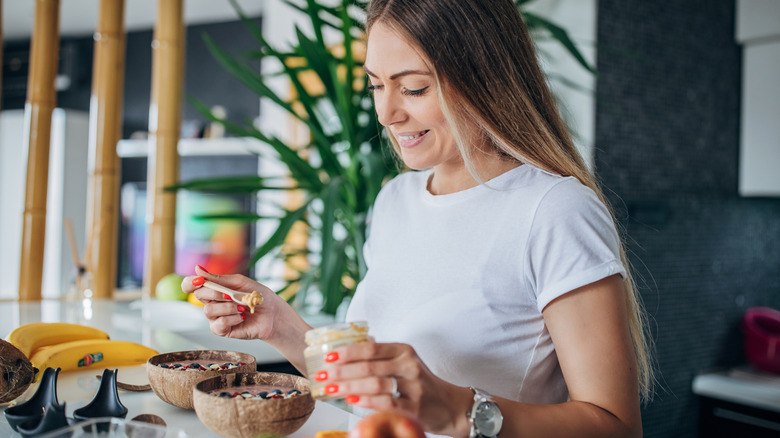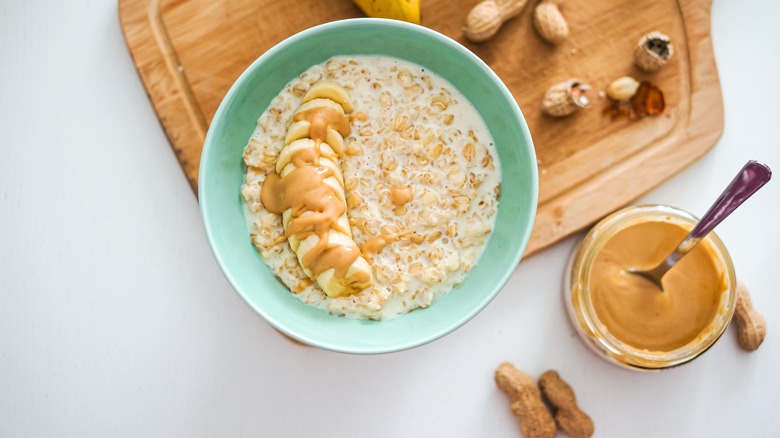What Happens To Your Body When You Eat Peanut Butter For Breakfast
For most of us, peanut butter on toast is a go-to for breakfast for a number of reasons — the food tastes great, it's superbly easy to put together, and you can even eat the stuff on the go if you need to.
But, there's another reason why you should be including this rich and nutty-flavored creamy or crunchy goodness in your morning meal — it curbs your cravings. Apparently, what really happens to your body when you eat peanut butter every day is that it increases the hormone peptide YY, which in turn decreases your appetite and makes you feel full for longer, per a 2012 study published in the British Journal of Nutrition.
The study, done by Purdue University and the Federal University of Vicosa in Brazil, involved three phases — one in which the participants consumed 1½ ounces of peanuts with orange juice and cream of wheat for breakfast, the second in which 3 tablespoons of peanut butter were consumed with the same accompaniments, and the third where no peanut butter was consumed but the calorie count remained the same. All three phases also involved having a lunch of white bread with strawberry jam. When blood samples and appetite levels were tested following both meals, the results revealed that those who ate peanuts and peanut butter for their morning meal had elevated levels of the hunger-suppressing hormone peptide YY. Those participants also showed less of an appetite 8-12 hours later and also had lower blood sugar levels post-lunch.
Why peanut butter can help you feel full for longer
The study seems to point toward the fiber and protein content in peanut butter, both of which can help you feel full for longer, per The Peanut Institute. The healthy fats in peanut butter can have the same effect. Just two tablespoons of peanut butter, or 36 grams of the stuff, has 7.1 grams of protein and 1.6 grams of total dietary fiber. Fiber is also related to all the good that happens to your gut health when you eat lots of peanut butter.
In addition to improving digestion, fiber adds bulk to the food in your digestive system, which is another reason why you won't get hungry soon after a peanut butter-on-toast breakfast. Getting enough fiber and protein in the morning is one of the most important tips if you're trying to watch your blood sugar levels or lose weight. You will start the day off with a nourishing meal and won't be tempted to snack on other stuff throughout the day. Minimizing cravings can help you stay consistent when it comes to eating healthy.
Natural peanut butter's low glycemic index also helps when it comes to keeping cravings at bay. When you start the day off with higher-GI foods like instant oatmeal, cornflakes, or white bread, you will invariably experience a sugar crash that will not only leave you feeling tired but also craving unhealthy treats.
How you should be including peanut butter for breakfast
Now that you have a new-found reason to shop for peanut butter, let's get into the nitty-gritty of what kind of peanut butter you should be consuming. Not all peanut butter brands are the same and not all of them are healthy. All you have to do is turn the bottle around and take a look at the ingredient list and you'll see additives such as more sugar, salt, and preservatives. All of these can easily throw you off the wagon, calories-wise, and even when it comes to spiking your blood sugar levels post breakfast.
Look for natural or organic peanut butter with as few ingredients as you can find — just peanuts and some salt is a good place to start. While the recommended amount to consume daily is two tablespoons, try combining the food with things like whole-grain toast, bananas, whole-wheat pita bread, a healthy smoothie, or a bowl of steel-cut oats, and your favorite fruits. Throwing in some probiotics like Greek yogurt can boost your protein intake at breakfast and also help you curb cravings through the rest of the day.
Be mindful not to eat too much peanut butter, though. The popular nut spread might be composed mainly of healthy fats, but it still contains some amount of saturated fat and is a calorie-rich food. Too much of a good thing can definitely be bad for you.


